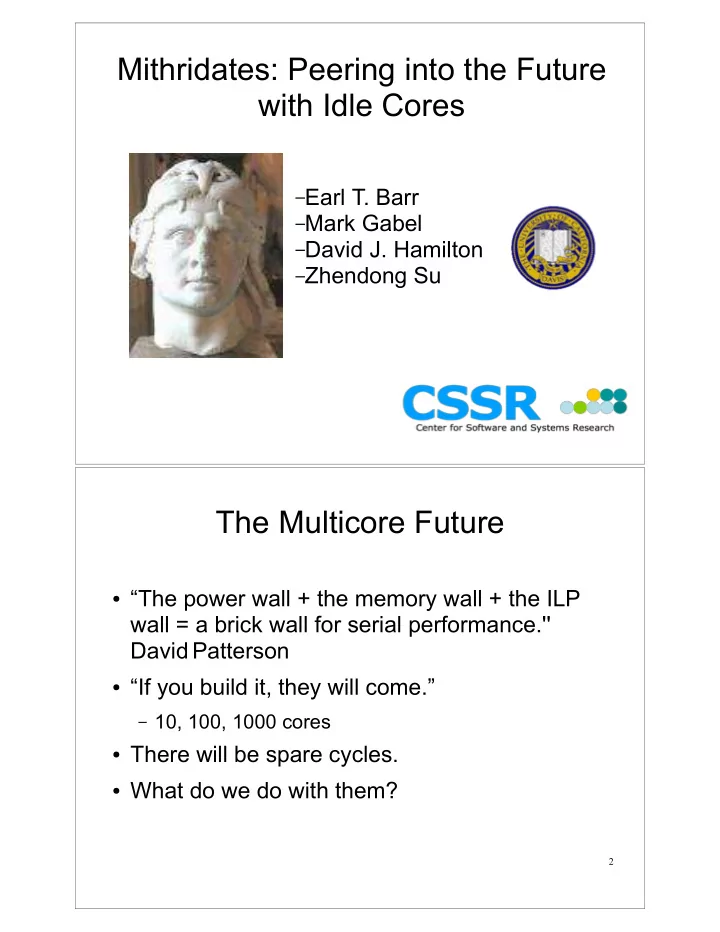

Mithridates: Peering into the Future with Idle Cores – Earl T. Barr – Mark Gabel – David J. Hamilton – Zhendong Su The Multicore Future � “The power wall + the memory wall + the ILP wall = a brick wall for serial performance.'' David Patterson � “If you build it, they will come.” – 10, 100, 1000 cores � There will be spare cycles. � What do we do with them? 2
Redundant Computation � Cheap computation changes the economics of exploiting parallelism. � Swap expensive communication with recomputation. � Parallelize short “nuggets” of code, such as invariants 3 Sequential Execution 4
Concurrent Execution 5 Concurrent Execution Communcation cost = communication synchronization + sending cost Z z z communication cost 6
Traditional Parallelism input available Z z z result required 7 Narrow Window input available Traditional techniques fail to parallelize code when overlap < 2 * comm. cost Z z z result required 8
Mithridates input available Eliminate input overlap < 1 * comm. cost communication cost. result required 9 What about result communication? � Run ahead to reduce the synchronization cost of result communication – Specialize via slicing – Schedule result calculation result across n threads required � Small results – invariants � one bit 10
Slicing input available input input available available Z z z result required 11 Slicing input available input available result required Z z z 12
Approach Transform a checked program into � A worker – Core application logic, shorn of invariant checks � Scouts – Minimum code necessary to check invariants assigned to them Then execute in parallel 13 Architecture 14
Coordination int a[10]; int a[10]; int a[10]; ... ... ... for(int i; i < 10; i++) { for(int i; i < 10; i++) { for(int i; i < 10; i++) { t = f(i); t = f(i); t = f(i); assert (t < 10); assert (t < 10); assert (t >= 0); assert (t >= 0); sem.down(); sem.up(); sum += a[t]; sum += a[t]; } } } ... ... ... Scout Original Worker 15 Scout Transformation � Assign invariants to each scout � Remove code not related to assigned invariants – Program slicing � Scouts do less work, so they can run ahead � Short-sighted oracles 16
Control Flow Graph 17 Environment � Any data not computed by the program – I/O, embedded programs, entropy ... ... ... sem.down(); d = prompt user; d = prompt user; d = q.dequeue(); ... ... q.enqueue(d); sem.up(); ... Original Worker Scout 18
Invariant Scheduling ... s 0 � 0 int a[10]; ... ... s 1 � 1 for(int i; i < 10; i++) { t = f(i); ... � : assert (t < 10 && t >= 0); s 2 � 2 sum += a[t]; } ... ... s n-1 � n-1 ... Trace 19 Linked List 20
Linked List Results 21 Apache Lucene 22
Future Work � Pre-compute expensive functions? � Extend to multi-threaded code � Automate the transformation – Javassist – Soot – WALA � Share Memory 23 Memory Cost � O(n * (|P| + e)) – n = number of scouts + 1 – |P| is the high-water size of � Program � Stack � Heap – e is � input queue � semaphores � code to check invariants 24
Memory Sharing w 0 w 0 w 0 w 0 w 0 w 1 w 1 w 1 w 1 w 1 s 0 s 1 Worker 25 Questions? 26
Related Work � Thread level speculation (TLS) – Specialized hardware – Rollback implies expected performance gain � Mithridates: Language-level, source-to-source – Runs on commercially-available, commodity machines today – Predictable performance gain 27 Related Work � Shadow processing – Main and Shadow – Shadow trails Main to produce debugging output � Mithridates – Enforces safety properties (sound) – Formal transformation – Invariant scheduling 28
Summary Static Costs Mithridates TLS Traditional Input Rewrite to synchronize Identify guess Identify input Handling environmental points available interactions Result Identify result required Add logic to Identify result Handling and rewrite to insert detect and resolve required milestones conflict and identify result required 29 Summary Runtime Costs Mithridates TLS Traditional Input Synchronized Communication Communication Handling environmental cost cost interaction Result Communication cost Communication Communication Handling - mitigation (slicing & cost + conflict cost invariant scheduling) resolution 30
Questions? 31 Issues – Handling Libraries Ps � is too large Pw � Libraries – not applications � Few Concerns / High Cohesion 32
Assumptions � Cores run at same speed � Cores share main memory � We do not model cache effects � We have source code 33 Related Work: TLS guessed input input available input input input available available available Z z z Z z z result result required required 34
Recommend
More recommend